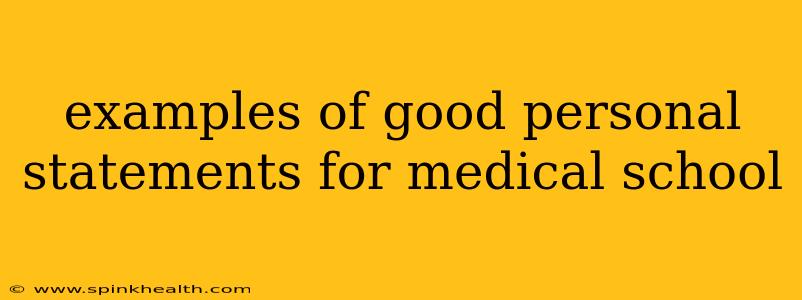Crafting Your Winning Medical School Personal Statement: Examples and Insights
The medical school personal statement. Just the words themselves can send shivers down the spine of even the most accomplished pre-med student. It's your chance to shine, to tell your story, to convince admissions committees that you're not just another applicant, but the perfect addition to their incoming class. But where do you even begin? Let's explore some examples and the key elements that make a personal statement truly stand out.
What Makes a Good Personal Statement?
Before diving into examples, let's establish what constitutes a truly excellent medical school personal statement:
- Authenticity: It's your story, told honestly and passionately. Avoid clichés and generic statements; focus on what makes you unique.
- Narrative Arc: Your statement should have a beginning, middle, and end, with a clear progression of events and ideas. Think of it as a mini-autobiographical essay, focused on your journey toward medicine.
- Specific Examples: Avoid vague statements. Use concrete examples to illustrate your points and showcase your experiences.
- Reflection & Growth: Show how your experiences have shaped your perspective and prepared you for the challenges of medical school. Highlight your growth, both personally and professionally.
- Clarity & Conciseness: Use clear and concise language. Avoid jargon and overly complex sentences. Get to the point and make your impact.
- Strong Conclusion: Reiterate your passion for medicine and why you're a good fit for the specific school.
Example 1: The Unexpected Path
This example focuses on a non-traditional path to medicine, highlighting resilience and personal growth.
"The rhythmic beeping of the heart monitor became the soundtrack of my childhood. Growing up in a small town with limited resources, I witnessed firsthand the disparities in healthcare access. My grandmother's struggle with a chronic illness, compounded by the lack of specialized care, ignited a fire in me. This wasn't a straightforward path, however. A detour through the business world taught me valuable lessons about teamwork and problem-solving, skills I now recognize as essential for effective healthcare delivery. It was during a volunteer experience at a free clinic that I finally found my true calling. Witnessing the power of empathy and compassionate care solidified my commitment to medicine. I'm ready to face the challenges ahead, armed with the resilience learned through adversity and a deep-seated desire to make a tangible difference in the lives of others."
Example 2: The Research Focus
This example centers on research experience, demonstrating intellectual curiosity and dedication.
"My fascination with the human body began in a high school biology lab, dissecting a frog and marveling at the intricate systems within. That initial curiosity evolved into a passion for research, culminating in my undergraduate thesis investigating the genetic basis of a rare neurological disorder. The long hours, the setbacks, the ultimate breakthroughs – these experiences shaped me profoundly. They instilled in me not just scientific rigor but also the importance of collaboration, perseverance, and attention to detail, qualities I believe are crucial in the medical profession. I'm confident that my research background will contribute meaningfully to the innovative environment at [Medical School Name], and I eagerly anticipate the opportunities to continue my work in [Specific area of research]."
Example 3: The Humanitarian Focus
This example highlights experience working with underserved populations, showcasing compassion and commitment to social justice.
"My summers spent volunteering at a rural health clinic in Guatemala profoundly altered my perspective on healthcare. Working alongside community health workers, I witnessed the profound impact of limited resources on individuals' health outcomes. The experiences, though challenging, instilled in me a deep empathy for underserved populations and a commitment to addressing health disparities. I learned firsthand the importance of cultural sensitivity and the power of holistic care. This commitment extends beyond patient care; I actively sought opportunities to advocate for policy changes that address the root causes of health inequities. I believe that my experiences, coupled with my dedication to social justice, will make me a valuable member of your medical community."
Addressing Common PAA Questions:
- What are some common mistakes to avoid? Avoid clichés, generic statements, and focusing solely on accomplishments without reflecting on your growth. Proofreading is crucial!
- How long should a personal statement be? Generally, aim for around 500-600 words. Follow the specific guidelines provided by each medical school.
- How can I make my personal statement stand out? Be authentic, focus on a compelling narrative, provide specific examples, and demonstrate self-awareness and reflection.
- What if I don't have extensive medical experience? Highlight other relevant experiences that demonstrate qualities valuable in medicine, such as teamwork, problem-solving, leadership, and compassion.
- When should I start writing my personal statement? Begin early! Give yourself ample time to brainstorm, draft, revise, and seek feedback.
Remember, your personal statement is your opportunity to showcase your unique journey and potential. By combining a compelling narrative with thoughtful reflection and specific examples, you can craft a statement that resonates with admissions committees and helps you secure your place in medical school.

